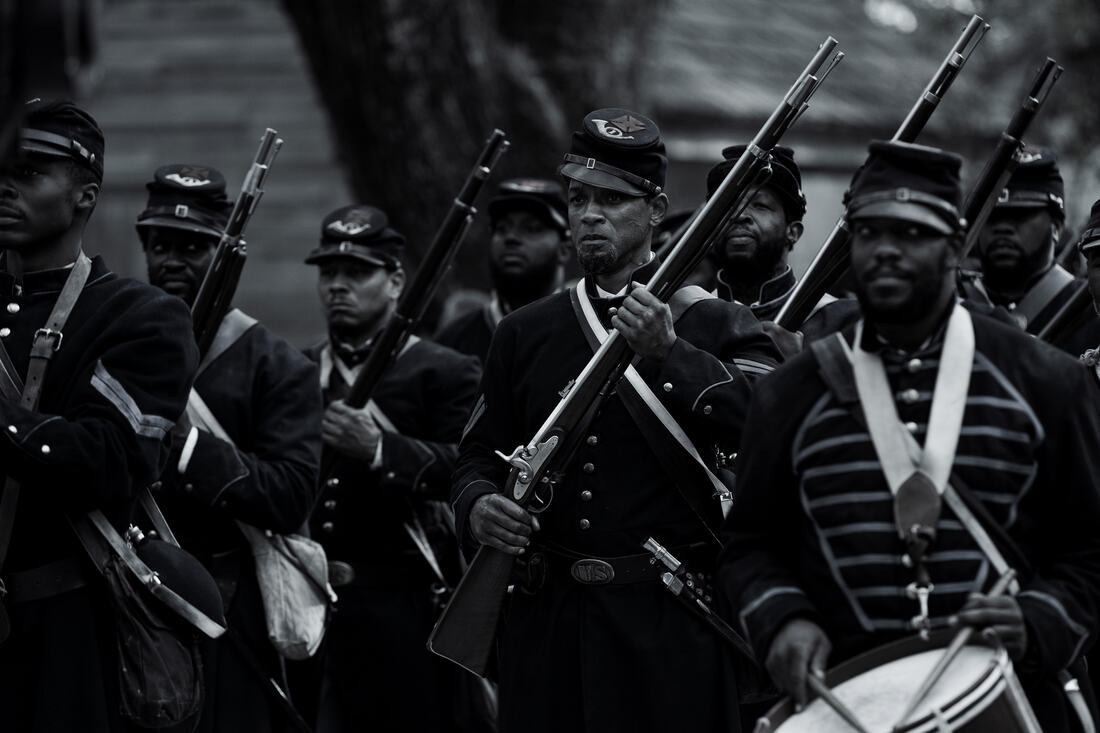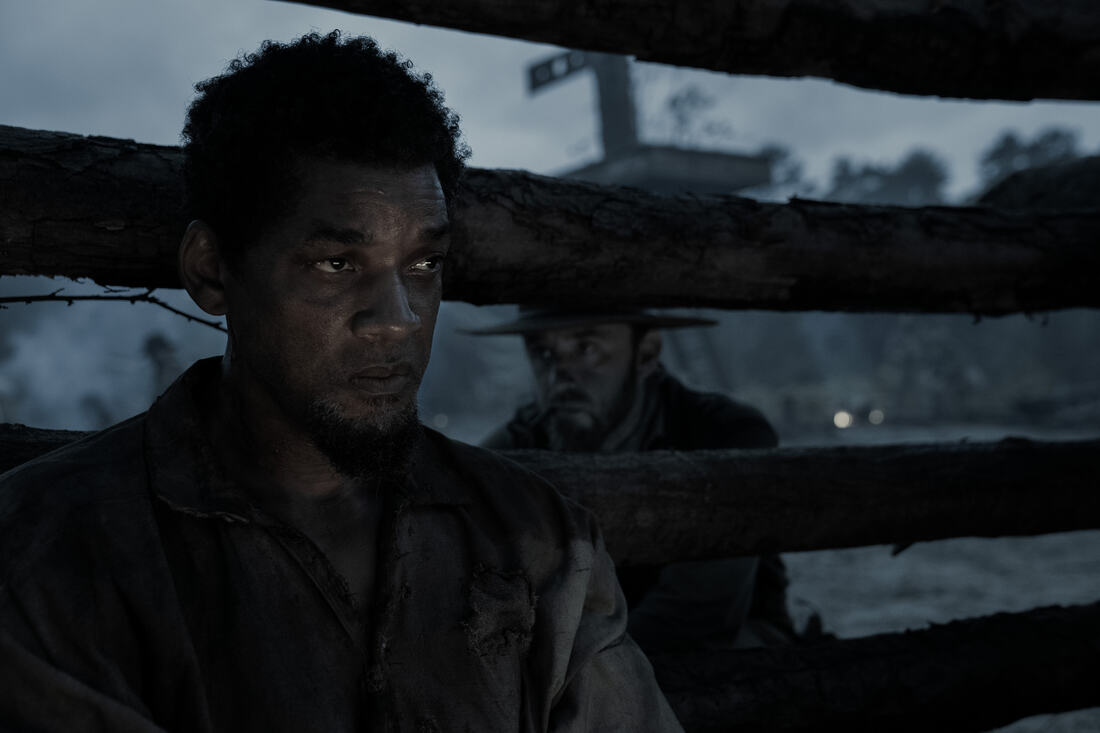|
Interview by Dan Skip Allen Antoine Fuqua’s new drama Emancipation, starring Will Smith in a story inspired by the picture of “Whipped Peter,” is considered to be a strong awards contender for several below-the-line awards. We at disappointment media got the opportunity to speak with several of the craftspeople behind the film, including VFX supervisor Rob Legato, costume designer Francine Jamison-Tanchuck, production designer Naomi Shohan, editor Conrad Buff, cinematographer Robert Richardson, and re-recording mixer Steve Pederson. disappointment media: How did you get the look of the film and the splashes of color and make it look seamless? Rob Legato: Part of what we did when we were coming up with the look for the film is that, instead of going full black and white, we would first adjust the different colors — red, green, and blue contributions — to that black and white. Like if you had a red shirt on, and you were to change the contribution of that particular color layer, you can adjust its gray value to anything that you want. You're able to kind of fine-tune match it and then mix a little of the color back in. And then on top of that, if we want to add a little red or a little green or a little from the foliage, we could do that. But so what we had is complete control as if it was all black and white. We could change any costume or any shade to whatever gray value seemed to make the most sense or look the most pleasing or match and then mix back color into that. So we were able to creatively create this palette that Bob [Richardon] would sit in with dailies colorist Benny, and every day make the subtle artistic adjustments. So that, mixed with the costumes and the art direction, we were able to very finely control it for artistic reasons. Bob would sit with the colorist every day and make these very subtle adjustments based on the drama that he and Antoine [Fuqua] had worked out. It was a fun collaboration. It was very fun to do it and come up with something because the look was so wonderful for the film, that we were very excited every day to come out of dailies and we would find something that we really liked that played the drama very well. Francine Jamison-Tanchuck: I agree with Rob. My collaboration with Bob Richardson and Antoine and Naomi [Shohan] every day or at least once a week was to find out what these colors are going to do on screen — figuring out how much over dyeing it needed or if it had to be dyed at all, or aged, and how all of that blends in and just makes it appear to be seamless. So I think with Bob's wonderful photography, and with Naomi’s sets, with all of that came Antoine's vision of what that is and what that could be. And the sense of as Peter is running, and the way that he is going through a lot of the terrain and a lot of the sense of what he is encountering along the way, all of that has to be really reviewed on how that works and how that translates with the costumes and what happens with them along the way. I feel by viewing the film, it really did work. A lot of that is because of collaborating with all of the department heads and people who really know their profession, and just making it all work together. I think we all felt that it was a story that really had to be told and wanted it to be told realistically. Naomi Shohan: The choice of the way color was used here that Bob and Rob have been discussing, there's kind of a distancing that happens with black and white that also creates intimacy. So there's this contradiction in terms that works very beautifully to allow you to both receive the movie and also kind of look at it as a time-out-of-time experience. I also want to say that everybody did a lot of research on this project. We all had a pretty good visual understanding, at least, of enough of what this world was in order to try to recreate it. Also, the landscapes that we used to film the movie are magnificent and Antoine had said that he wanted the movie to be both beautiful and brutal. As we explored them scouting for locations, they spoke eloquently to us. I think that the land had a little bit to say to us as well about what may have happened in the past, even our experience of how rugged it was to be living and working there. So the combination of historical research, the poetic distancing, and listening to the land — all of these things contributed to the unity of the end result and Antoine’s striving vision. disappointment: On all of his appearances to promote the film, the thing he mentioned that stood out was that he didn’t want to take away from the people that made this movie. You all deserve being championed. Would anyone like to comment on him standing up for the people like you behind the scenes? Conrad Buff: I think we all certainly appreciate it. We all know how much work was put into making this and how we all supported Antoine. You know, on the production end of things I was spared, of course, being in editorial and distant from Louisiana, but Antoine had so many challenges on this film. That sad incident with Will at the Academy Awards was like one more difficulty to overcome. So I know all of us certainly appreciate him acknowledging our work. He couldn't have been more lovely in my dealings with him, which were primarily in post production. Rob Legato: I only got to work with him a couple of times, but I got the impression just from working on this film, that his comment is how he really feels because he's appreciative every day. He was excited by the shots that Antoine and Bob would create that he would see playbacks of and all the contributions of everybody on the film productions on costume and everything. So he was, in my view, always in everyone's corner — everybody out collaborating, producing the movie. So I’m not terribly surprised that's the comment he would make about this and not wanting whatever happened to diminish the contribution he felt everybody made while we were making the movie. Not just as a response or nice thing to say afterwards, but as something that he feels rather deeply and as a performer, he's appreciative of the art form of everybody else who makes him look good. Robert Richardson: I agree with you totally, too. I think that Will’s spirit is one of giving. He was remarkable to work with. He led us, he sat on the set on the most difficult days and waited out. He didn't go to his trailer, he was with us. We all appreciated it. And of course, he continued that, despite what took place. And he's a true gentleman. Rob Legato: I remember when we were shooting the pit scene where we threw the older gentleman into the pit. I think he offered something like $5,000 to everybody who had to now lay in that pit in the hot sun. So he appreciated even that work that the extras were doing and the other people who were in it. He was always involved and always appreciative of the contribution and the difficulty of shooting this film, which was pretty difficult to shoot. High heat and thunderstorm and lightning conditions would interrupt shooting every so often. So he was a very generous man I have to say. Francine Jamison-Tanchuck: I totally agree with everyone that Will Smith has got to be one of the kindest, warmest, just understanding people I've ever worked with in front of the camera. He was just a very gracious person and he was just so appreciative of everyone's work. Especially with the type of character that this man was going through all these months. He is a human being first and his acting and everything comes next. But he was so professional and such a gracious person and who knows how that affected him later. But as far as working with all of us and just working with him in the fittings and on the set, there was not one time that he did not have a kind word for anyone and everyone. So I feel that he is just really the epitome of professionalism. He is the epitome of what it is to be a humble and gracious filmmaker. I just feel very honored to work with him any day, anytime, and to work with all of these wonderful filmmakers that are here now. And I'd like to say a comment to Bob Richardson, Bob Richardson, I do not care what color you are. To me you had your vision and what you did on this film, just brought it all to a reality that the entire world needs to know about and needs to see. And for as far as I'm concerned, you are an American, artistic, incredible cinematographer that Antoine in his vision knew that he needed that hand in order to make this to bring this to the screen. And also Naomi's wonderful sets and Cindy, and add all of the collaboration. It doesn't matter where you're coming from, what your your skin tone is, your gender, your age — it is about really having the compassion and knowing and seeing that something's wrong in this picture. There's something wrong when one human being has to brutalize a mother. And so in having that vision and having that scope, you really brought it, everyone brought it out and just brought it to a reality. And I commend everybody. Thank you so much. Steve Pederson: Being part of the mix, we're at the very end. And Will did come in for a playback when we basically had everything there, it was 95% done. Will came in and was so appreciative when the lights came up of what he had heard and seen. And it was very gratifying for us because we took inspiration, the slap aside, from what was on the screen. Thanks to everybody here and what you had done, we felt we needed to step up the sonic and meet that. It's such an important film, we had such a great time doing it. Will was appreciative and we're very appreciative of Will and what he did and his performance, that we all felt we had to rise to that level. And it was such a pleasure to meet him and to get his feedback and to see how he responded to our work. Emancipation is now streaming on Apple TV+.
0 Comments
|
Archives
March 2024
Authors
All
|
|
|
disappointment media
Dedicated to unique and diverse perspectives on cinema! |


